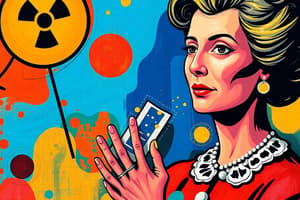Podcast
Questions and Answers
What significant discovery did Marie Curie and Pierre Curie make in 1898?
What significant discovery did Marie Curie and Pierre Curie make in 1898?
- The invention of radiotherapy
- The first research on cancer treatment
- The discovery of polonium and radium (correct)
- The isolation of radium
In which year did Marie Curie win her first Nobel Prize?
In which year did Marie Curie win her first Nobel Prize?
- 1911
- 1898
- 1903 (correct)
- 1910
How many Nobel Prizes did Marie Curie win throughout her career?
How many Nobel Prizes did Marie Curie win throughout her career?
- Four
- One
- Three
- Two (correct)
What motivated Marie Curie to pursue her education despite barriers?
What motivated Marie Curie to pursue her education despite barriers?
With whom did Marie Curie collaborate in isolating radium?
With whom did Marie Curie collaborate in isolating radium?
Who was the first to discover natural radioactivity?
Who was the first to discover natural radioactivity?
What term did Marie Curie coin?
What term did Marie Curie coin?
What did Henri Becquerel experiment with to discover radioactivity?
What did Henri Becquerel experiment with to discover radioactivity?
What was the fate of Pierre Curie in 1906?
What was the fate of Pierre Curie in 1906?
What type of illness did Marie Curie suffer from due to her work?
What type of illness did Marie Curie suffer from due to her work?
What did Marie Curie use her Nobel Prize money for during WWI?
What did Marie Curie use her Nobel Prize money for during WWI?
What organization did Marie Curie help establish to promote early cancer research?
What organization did Marie Curie help establish to promote early cancer research?
What health issue did Marie Curie suffer from due to prolonged radiation exposure?
What health issue did Marie Curie suffer from due to prolonged radiation exposure?
In what year did Marie and Pierre Curie win the Nobel Prize?
In what year did Marie and Pierre Curie win the Nobel Prize?
What was the cost of one gram of radium in 1921?
What was the cost of one gram of radium in 1921?
Study Notes
Marie Curie: A Pioneer in Radioactivity
- Marie Skłodowska Curie, born in 1867 in Warsaw, Poland, became a prominent scientist researching radioactivity.
- Curie was denied higher education in Poland due to her gender, leading her to pursue studies secretly.
- She received her degrees in physics and mathematics at the Sorbonne in Paris, where she met Pierre Curie.
- Curie and Pierre Curie, together, discovered polonium and radium, contributing to the understanding of radiation.
- The discovery of polonium and radium earned the Curies, along with Henri Becquerel, the 1903 Nobel Prize in Physics.
- Marie and Pierre Curie isolated radium, which was later used in radiotherapy, revolutionizing cancer treatment.
- Curie’s work earned her two Nobel Prizes: Physics in 1903 and Chemistry in 1911, establishing her as a pioneer in the field.
- Pierre Curie died in a carriage accident in 1906, leaving Marie to continue their research.
- Curie took over her husband's physics professorship at the Sorbonne and isolated pure radium in 1910, earning her the 1911 Nobel Prize in Chemistry.
- She used her Nobel Prize winnings to fund mobile X-ray units in WWI, saving the lives of numerous soldiers.
- Curie dedicated her life to research and established the Curie Foundation to pioneer early cancer research using radium.
- Curie's groundbreaking work, though groundbreaking, led to her death from bone marrow disease at 66 due to radiation exposure.
Henri Becquerel: Discovering Natural Radioactivity
- Henri Becquerel, a French physicist, discovered natural radioactivity in 1896.
- While studying X-rays, Becquerel observed uranium emitted radioactive particles.
- He conducted experiments with uranium salts, leading to the discovery of their radiation emission.
Danger and Value of Radioactivity
- Marie Curie coined the term "radioactivity," highlighting the energy released by atoms during disintegration.
- Despite its dangers, the significance of radiation was acknowledged by Curie and other scientists.
- Curie tragically succumbed to radiation sickness from prolonged exposure to radioactive materials.
The Legacy of the Curies
-
Marie and Pierre Curie's contributions to the understanding of radioactivity had a significant impact on medicine and science.
-
Their work paved the way for cancer treatment and research using radium.
-
The Curies’ dedication to knowledge led to the development of mobile X-ray units, which significantly aided soldiers during WWI.
-
The Curies’ perseverance and their collaborative spirit set a precedent for scientific exploration, pushing the boundaries of knowledge and its applications in medicine.
-
It is important to remember Curie’s advocacy for knowledge sharing. She never sought personal gain from her discoveries, constantly prioritizing the betterment of humanity through the application of science.
Studying That Suits You
Use AI to generate personalized quizzes and flashcards to suit your learning preferences.
Description
Explore the life and achievements of Marie Curie, a groundbreaking scientist in the field of radioactivity. From her early struggles in Poland to her Nobel Prize-winning discoveries with Pierre Curie, this quiz covers her contributions to science and medicine, including the development of radiotherapy. Test your knowledge on this remarkable figure's legacy!





